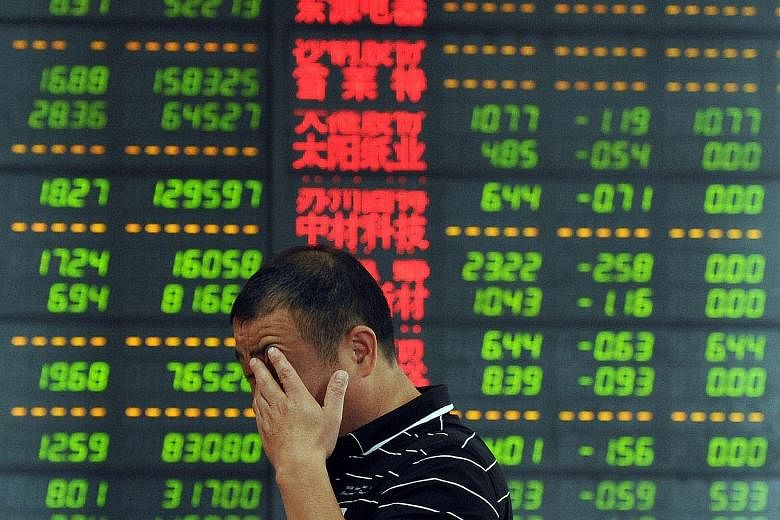In an unprecedented move to escape the panic selling of Chinese stocks, hundreds of listed mainland companies voluntarily suspended trading of their shares yesterday.
To date, more than 1,300 of some 2,800 companies listed in Shanghai and Shenzhen have filed for a trading halt - the largest wave of trading halts ever, reports said.
The suspended stocks had a total market value of US$2.2 trillion (S$3 trillion).
Despite the suspensions, Shanghai stocks nosedived 5.9 per cent while Shenzhen sank 2.5 per cent.
The carnage spilled over to Hong Kong, which suffered its biggest one-day plunge since October 2008, slumping 5.84 per cent.

Japan tumbled 3.14 per cent, Taiwan sank 2.96 per cent and Malaysia dipped 0.96 per cent.
Here, the Straits Times Index suffered one of its biggest one-day falls so far this year, sliding 55.94 points, or 1.67 per cent, to 3,284.99.
Since China's stocks started their freefall on June 12, Shanghai has lost 32 per cent.
"What happened in China (yesterday) is unprecedented, just like the 50-plus MRT stations on the North-South and East-West lines that did not operate (on Tuesday night)," a local remisier said.
Many Chinese companies did not give reasons for their trading suspensions, though some cited unspecified key events, asset restructuring, or private share placements, according to various reports.
Short-selling and margin unwinding following restrictions on margin trading - where investors borrow funds from brokerages to buy stocks - have erased more than US$3.2 trillion off Chinese stocks' value in recent weeks. Short-selling allows traders to bet on falling markets and can be used as a tool to hedge their holdings. In China, short-selling is allowed on futures contracts linked to the CSI 300, SSE 50 and CSI 500 indexes.
"We have a number of retail players who trade the China A50 Index Futures, which are priced off the stock markets. There was a lot of pain there because the index was down about 15 per cent yesterday, and that was a huge move," CMC Markets analyst Nicholas Teo said.
"We are going into a new area where nobody knows what is going to happen, just like if Greece were to exit the euro. I don't know how this situation (involving China) will pan out," Mr Teo said.
The sell-off came despite the government ramping up efforts to stabilise the market, including China Securities Finance Corp giving 260 billion yuan (S$57 billion) in credit lines to 21 brokerages to help them buy stocks. Other recent policies include halting 28 initial public offerings and forcing China's main stock brokers to create a 120 billion yuan market stabilisation fund.
Mr Vishnu Varathan of Mizuho Bank said China cannot afford a stock market meltdown when it is still struggling to stabilise the property market and wider economy.


